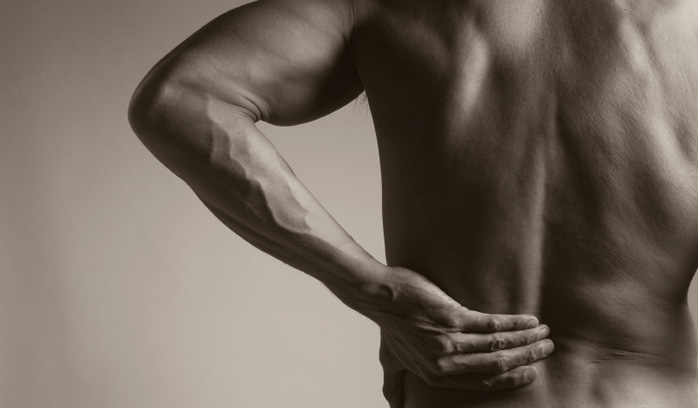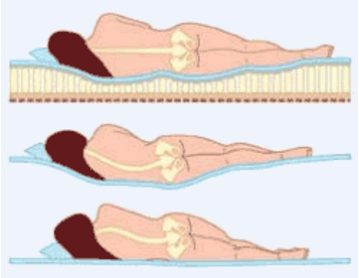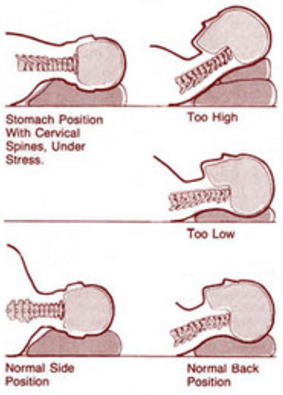Top 3 Reasons You Have Morning Back Pain & Stiffness

Why Do I Have Back Pain in The Morning?
One question I have heard frequently in recent weeks involves waking up with morning back pain or stiffness. This seems to be more prevalent during winter months due to colder temperatures and longer hours of darkness. These factors can bring more sleep and more time in our cozy warm beds. It’s normal to sleep more during the winter months. The sun goes down earlier, and our internal clocks adjust accordingly. If you’re anything like me, you’re ready for bed around 8:30! The increased mattress time can lead to more morning back pain or neck pain for some. Some people experience low back stiffness in the morning all the time. So here is the answer to the question “Why does my back/neck hurt more in the morning?”
In most people, it’s from one of three things: an unhappy lumbar disc, a rough night sleep, or arthritis.
1. Morning Back Pain from a Lumbar Disc
People with discogenic low back pain (derangement, herniated disc, bulging disc) will often feel worse in the morning because of the hydrodynamic properties of the lumbar disc. The center of the disc is made up of a viscous, jelly-like substance which absorbs water during the restful hours at night. As the day goes on, your movements and gravity will compress the disc, removing excess fluid. This takes some of the pressure off the pain sensitive outer-covering and surrounding muscles and nerves. During the night when you’re on your back, gravity is taken out of the equation (relatively) and your discs reabsorb some water making them a little larger by the time you wake up. That increased size can lead to reactionary muscle tightness, soreness, etc.
What are some other signs that you might have discogenic low back issue (outside of pain)? Chronically tight hamstrings, difficulty getting out of a chair or car, and back pain with certain motions (usually bending over or lifting) are a few examples.
2. Morning Back Pain from a Bad Night Sleep
Your spine has natural curves to allow mechanical pressures and stresses to be evenly distributed. Poor sleeping postures or a bad mattress can stress your spine in the wrong directions. When you sleep, the muscles that keep everything together and “in-line” are relaxed and this leaves your spine to rest on the ligaments. The body doesn’t like this very much and it’s natural reaction is to tighten up area musculature. Poor sleeping postures (on your side with a slanted hip, your stomach, etc.) work on the same principle. The best way to figure out if your mattress is causing your morning low back or neck stiffness is to sleep on something else for a night. If you wake up refreshed and better, then it’s time for a new mattress. There are many options available, but often the differences between them can just be good marketing. I recommend finding one in the middle price range, not so cheap you’ll be replacing it next year and not so expensive you have to refinance your house, and the vast majority of you should be just fine.


3. Morning Back Pain & Stiffness from Arthritis
One of the hallmark symptoms of arthritis (AKA Degenerative Joint Disease, DJD, and Osteoarthritis, OA) is morning stiffness that lasts for an hour or so until you get “warmed up” and moving. Arthritis is an inflammatory process and the swelling can occur overnight (swelling is a key part of inflammation). Unlike what we mentioned before, the swelling in OA occurs in the joint spaces – not within the disc. Either the joint covering (synovium) or the fluid inside the joint (synovial fluid) can increase in space or volume. The inflammatory process draws in more liquids and the lack of movement (because you’re sleeping) keeps the fluid and inflammatory chemicals from getting pushed out sooner. DJD is a common problem, especially as we age, but that doesn’t mean it should be taken lightly or ignored. DJD is a disease process that usually only worsens and should be managed (because there is no cure) to ensure proper motion, function, and quality of life can be maintained throughout the years to come.
 262-373-9168
262-373-9168



